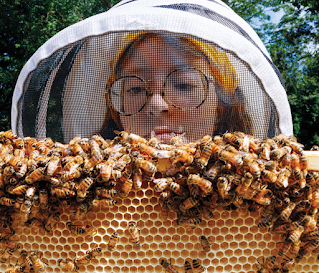"Safeguarding Rhode Island's Vital Pollinators: A Call to Protect Our Bees"
In this informative article, we delve into the critical mission of preserving Rhode Island's native bee populations. A must-read for environmental activists, concerned citizens, and anyone passionate about our planet's biodiversity, it explores the challenges and solutions related to bee conservation.
🌻 Uncovering the Bees' World On a picturesque summer day, research associate Casey Johnson, along with graduate student Julia Vieira and a team of dedicated students, carefully survey a field of wildflowers at the University of Rhode Island's East Farm. Their mission: to study and protect bees, the unsung heroes of our ecosystem.
🐝 The Bee Watchers They meticulously examine clover and selfheal plants in vibrant hues, all while searching for bees. When a bee is spotted, they gently capture it in a vial for close examination, noting its species and the plant it was found on before releasing it to continue its vital role in pollination.
🏞️ The Unique Ecosystem East Farm, a hidden gem near the university's Kingston campus, is an 85-acre paradise dedicated to studying the diverse flora and fauna. For Professor Steven Alm and his team, it serves as the epicenter of bee research in Rhode Island, a state where the bee population is in jeopardy.
🌾 Honeybees vs. Native Bees While honeybees often steal the spotlight in discussions on endangered species, it's crucial to acknowledge the impact of non-native honeybees on Rhode Island's native bee populations. Katie Schortmann from the Audubon Society highlights the complex relationship between honeybees and their wild counterparts.
📊 Alarming Statistics Rhode Island's native bee population faces challenges, as a URI study in 2021 revealed a significant decline in the number of bumblebee species. Nationwide, the bumblebee population has dwindled by up to ninety percent over the past two decades, posing a considerable threat to our environment.
🍯 The Bees' Importance The article underscores the invaluable role bees play in pollinating essential crops, from chocolate and coffee to tomatoes, blueberries, and squash. Without them, our food supply would be severely impacted.
🦋 Factors Affecting Bees Various factors contribute to the decline of bees, including pesticides, climate change, and habitat loss. These issues are forcing bees into smaller spaces and making survival challenging, especially in warmer regions.
🌸 Ways to Support Our Bees The article offers practical steps to help native bees thrive. Planting bee-friendly flowers, avoiding pesticide-laden plants, allowing wild clover to grow in your lawn, and leaving leaves for overwintering bees are just a few ways to make a difference.
🌍 A Collective Effort While systemic changes in farming and pesticide use are essential for global bee conservation, everyone can contribute to saving these vital pollinators. Awareness, education, and action in our own backyards are vital steps in the right direction.
📚 Cultivating Environmental Stewards To ensure a sustainable future, it's crucial to educate the next generation. Initiatives like the Audubon Society's educational programs aim to instill a lifelong appreciation for bees and other pollinators, emphasizing the importance of becoming responsible stewards of our environment.
#BeeConservation, #Pollinators, #EnvironmentalStewardship, #Biodiversity, #RhodeIslandBees

